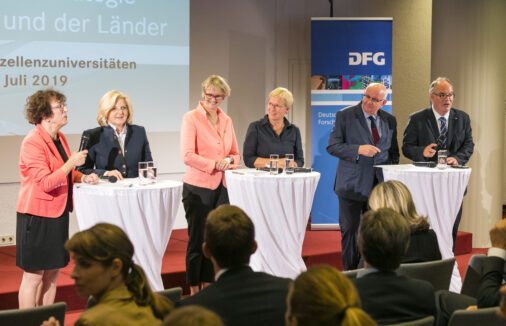Facts and Figures

Who receives funding?
In the first round of the Excellence Strategy, 57 Clusters of Excellence have received funding since 2018, while ten Universities of Excellence and one University Consortium of Excellence have been funded since 2019.
The 57 Clusters of Excellence are located at 34 universities spread across Germany. The willingness to cooperate across institutions is reflected in the number of Clusters of Excellence consisting of several applicant universities. 25 percent of the Clusters of Excellence are based at two universities, another five percent at three applicant universities. The subject distribution of the Clusters of Excellence across the four scientific disciplines is broad: 18 percent of the Clusters of Excellence are assigned to the humanities and social sciences, 26 percent to the life sciences, 35 percent to the natural sciences and 21 percent to the engineering sciences. A high degree of interdisciplinarity can also be observed within the Clusters of Excellence.
Collaboration with other institutions is essential in both funding lines, and the funded Clusters of Excellence and Universities of Excellence collaborate with numerous partners such as non-university research institutions, non-university hospitals, academies of science, museums and collections, state research institutions and universities of applied sciences. As such, the Excellence Strategy benefits from and contributes significantly to the further networking of Germany as a hub of science and research.
The call for the second round of Clusters of Excellence opened in December 2022, with funding due to begin in 2026. The call for the Universities of Excellence funding line will follow in early 2024, with up to four more universities or consortia able to receive funding from 2027. If universities drop out of the funding line, additional spots might then become available. New universities might be funded through those additional spots, should they meet the funding requirements.
Review and Selection Process – Clusters of Excellence

As a first step, new participants in the competition are required to submit a draft proposal. These are reviewed by internationally renowned researchers, with the successful Clusters of Excellence being asked to write a full proposal. In a second step, the newly invited Clusters of Excellence and those already receiving funding may submit their full proposals. Once all the proposals have been reviewed, the final funding decision is taken by the Excellence Commission, which consists of 39 internationally renowned experts involved in different fields of science and research along with the federal and state ministers responsible for science and research. The Deutsche Forschungsgemeinschaft (DFG, German Research Foundation) is responsible for the evaluation process to select the Clusters of Excellence.
Review and Selection Process – Universities of Excellence
Universities of Excellence need at least two successful Clusters of Excellence to qualify to submit a proposal (or three Clusters of Excellence in the case of University Consortia). A panel of internationally renowned experts review the proposals on site. Comparing these reviews, the Excellence Commission (consisting of the 39 members of the Committee of Experts and the federal and state ministers responsible for science and research) decides which proposals are to receive funding. The Wissenschaftsrat (WR, German Science and Humanities Council) organises the selection process for the Universities of Excellence funding line.
Universities of Excellence and University Consortia of Excellence receive permanent funding but are required to undergo an evaluation organised by the German Council of Science and Humanities every seven years. This evaluation assesses whether they still meet the funding requirements. If this is not the case, the University of Excellence or University Excellence Consortium in question will no longer be eligible for funding in the funding line. A call for proposals might then be announced and additional spots for more universities potentially be filled by the Excellence Commission.

Decision-Making Bodies

The Committee of Experts consists of 39 members who have a proven track record of research in various fields of science. The members also have interdisciplinary and transdisciplinary expertise as well as longstanding experience abroad, in university management, in teaching or in the private sector. The Committee of Experts is chaired by the President of the DFG and the Chair of the German Science and Humanities Council. The chairpersons do not have voting rights. The tasks of the Committee of Experts include in particular defining the funding conditions and criteria for both funding lines, while it also evaluates drafts and proposals, and decides on the draft proposals that qualify for funding under the Clusters of Excellence funding line. Furthermore, it assesses the results of the evaluation of the Universities of Excellence, makes funding recommendations to the Excellence Commission and reports on the programme to the Gemeinsame Wissenschaftskonferenz (GWK, Joint Science Conference).
The Excellence Commission consists of the Committee of Experts and the federal and state ministers responsible for science and research. The chairs of the Committee of Experts chair the Excellence Commission. The latter decides on the funding of Clusters of Excellence and Universities of Excellence based on the recommendations made by the Committee of Experts, while also addressing the results of the evaluation of the Universities of Excellence.
